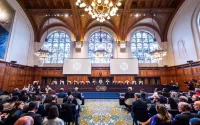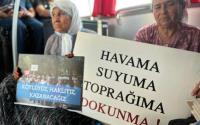Howard Zinn. Professor emeritus at Boston University. His classic work "A People's History of the United States" has sold over 1.5 million copies. His latest book is "A Power Governments Cannot Suppress." Noam Chomsky. Professor Emeritus of linguistics at the Massachusetts Institute of Technology. He is the author of dozens of books on linguistics and U.S. foreign policy. His latest book is "Failed States: The Abuse of Power and the Assault on Democracy."RUSH TRANSCRIPT
This transcript is available free of charge. However, donations help us provide closed captioning for the deaf and hard of hearing on our TV broadcast. Thank you for your generous contribution. Donate - $25, $50, $100, more...
AMY GOODMAN: We return to my interview with Noam Chomsky and Howard Zinn, who joined me in the studio here yesterday. We continued to look at the issues of academia in a time of war, so I asked Howard Zinn about his experience at Spelman College, the historically black college for women in Atlanta. Professor Zinn taught at Spelman for seven years before eventually being fired for insubordination. I asked him why he was pushed out.
HOWARD ZINN: I had supported the students, and this was the Civil Rights Movement, right? My students are black women who get involved in the Civil Rights Movement. I support them. The administration is nervous about that, but they can't really say anything publicly, or do anything, because this is the first black president of Spelman College. They have all been white missionaries before that. And so, he doesn't want to do anything then. But when the students come back from -- you might say, “come back from jail” onto the campus and rebel against --
AMY GOODMAN: What year was this?
HOWARD ZINN: This was 1963. And the students rebel against the conditions that they're living in, very paternalistic, very controlling, and I support them in that, then that's too much for the president, and so, although I have tenure and I’m a full professor and I’m chair of the department, I get a letter saying goodbye.
And so, that was my -- you know, what Noam was talking about when you ask him what's going to happen, universities, colleges are not democratic institutions. Really, they’re like corporations. The people who have the most power are the people who have the least to do with education. That is, they're not the faculty, they're not the students, they're not even the people who keep the university going -- the buildings and grounds people and the technical people and the secretaries -- no. They're the trustees, the businesspeople, the people with connections, and they're the ones who have the most power, they're the ones who make the decisions. And so, that's why I was fired from there, and that's why I was almost fired by John Silber at Boston University, but there was a --
AMY GOODMAN: Over what?
HOWARD ZINN: Over a strike. We had a faculty strike. We had a secretary strike. We had a buildings and ground workers strike. We had almost a general strike, almost an IWW strike at Boston University in 1977. And when the faculty had actually won, got a contract and went back to work, some of us on the faculty said we shouldn't go back to work while the secretaries are still on strike. We wouldn't cross their picket lines. We held our classes out on the streets rather than do that. And so, five of us were threatened with firing.
But there was a great clamor among students and faculty and actually across the country. They even got telegrams from France, protesting against this. And so, one of the rare occasions in which the administration, with all its power, backed down. And so, I barely held onto my job.
AMY GOODMAN: You begin your book with two quotes. One of Eugene V. Debs: “While there is a lower class, I am in it; and while there is a criminal element, I am of it; and while there is a soul in prison, I am not free.” And Henry David Thoreau: “When the subject has refused allegiance and the officer has resigned his office, then the revolution is accomplished.” You also write more about Henry David Thoreau. You write about him going to jail.
HOWARD ZINN: Yeah, well, Thoreau is worth reading today and remembering today, because Thoreau committed just a small act of civil disobedience against the Mexican War. I mean, the Mexican War had some of the same characteristics as the war in Iraq today, and that is that the American people were lied to about the reasons for going into Mexico, and they weren't told that the real reason for going into Mexico was that we wanted Mexican land, which we took at the end of the Mexican War, just as today we're not being told that the real reason for being in Iraq has to do with oil and profits and money. And so, the situation in the Mexican War, against which Thoreau objected, was in many ways, you know, similar.
And Thoreau saw that, and he saw that American boys were dying on the road to Mexico City and we were killing a lot of innocent Mexican people, and so he decided not to pay his taxes and spent just a very short time in jail, but then came out, delivered a lecture on civil disobedience and wrote an essay on the right to disobey the government when the government violates what it's supposed to do, violates the rights of Americans, violates the rights of other people.
And so, that stands as a classic statement for Americans, that it's honorable and right to not to pay your taxes or to refuse military service or to disobey your government when you believe that your government is wrong. And so, the hope is that today more soldiers who are asked to go to Iraq, more young people who are asked to enlist in the war against Iraq, will read Thoreau's essay on civil disobedience, will take its advice to heart, realize that the government is not holy, that what's holy is human life and human freedom and the right of people to resist authority. And so, Thoreau has great lessons for us today.
AMY GOODMAN: Noam Chomsky, as we wrap up, that whole issue of hope and where you see things going in the current Bush administration, what it stands for, and the level of protest in this country. Do you think that level of protest will succeed?
NOAM CHOMSKY: It depends what you mean by “succeed.” I mean, I have a slightly more hopeful sense than Howard, at least expressed. I suspect he agrees. It's true that the country, that in terms of the institutional structure -- government for the wealthy and so on -- there hasn’t been much change in 200 years.
But there's been enormous progress, I mean, even in the last forty years, since the ’60s. Many rights have been won: rights for minorities, rights for women, rights of future generations, which is what the environmental movement is about. Opposition to aggression has increased. The first solidarity movements in history began in the 1980s, after centuries of European imperialism, and no one ever thought of going to live in an Algerian village to protect the people from French violence, or in a Vietnamese village. Thousands of Americans were doing that in the 1980s in Reagan’s terrorist wars. It’s now extended over the whole world. There’s an international solidarity movement.
The global justice movements, which meet annually in the World Social Forum, are a completely new phenomenon. It’s true globalization among people, maybe the seeds of the first true international -- people from all over the world, all walks of life, many ideas which are right on people's minds and agenda, in fact, being implemented about a participatory society, the kind of work that Mike Albert’s been doing. These are all new things. I mean, nothing is ever totally new. There are bits and pieces of them in the past, but the changes are enormous.
And the same with opposition to aggression. I mean, after all, the Iraq war is the first war in hundreds of years of Western history, at least the first one I can think of, which was massively protested before it was officially launched. And it actually was underway, we have since learned, but it wasn’t officially underway. But it was huge, millions of people protesting it all over the world, so much so that The New York Times lamented that there's a second superpower: the population. Well, you know, that's significant and, I think, gives good reason for hope.
There are periods of regression. We're now in a period of regression, but if you look at the cycle over time, it's upwards. And there's no limits that it can't reach.
AMY GOODMAN: Noam Chomsky and Howard Zinn, two of this country's leading dissidents. We spoke yesterday on Patriot's Day, which is observed here in Massachusetts -- also, I believe, in Maine.






